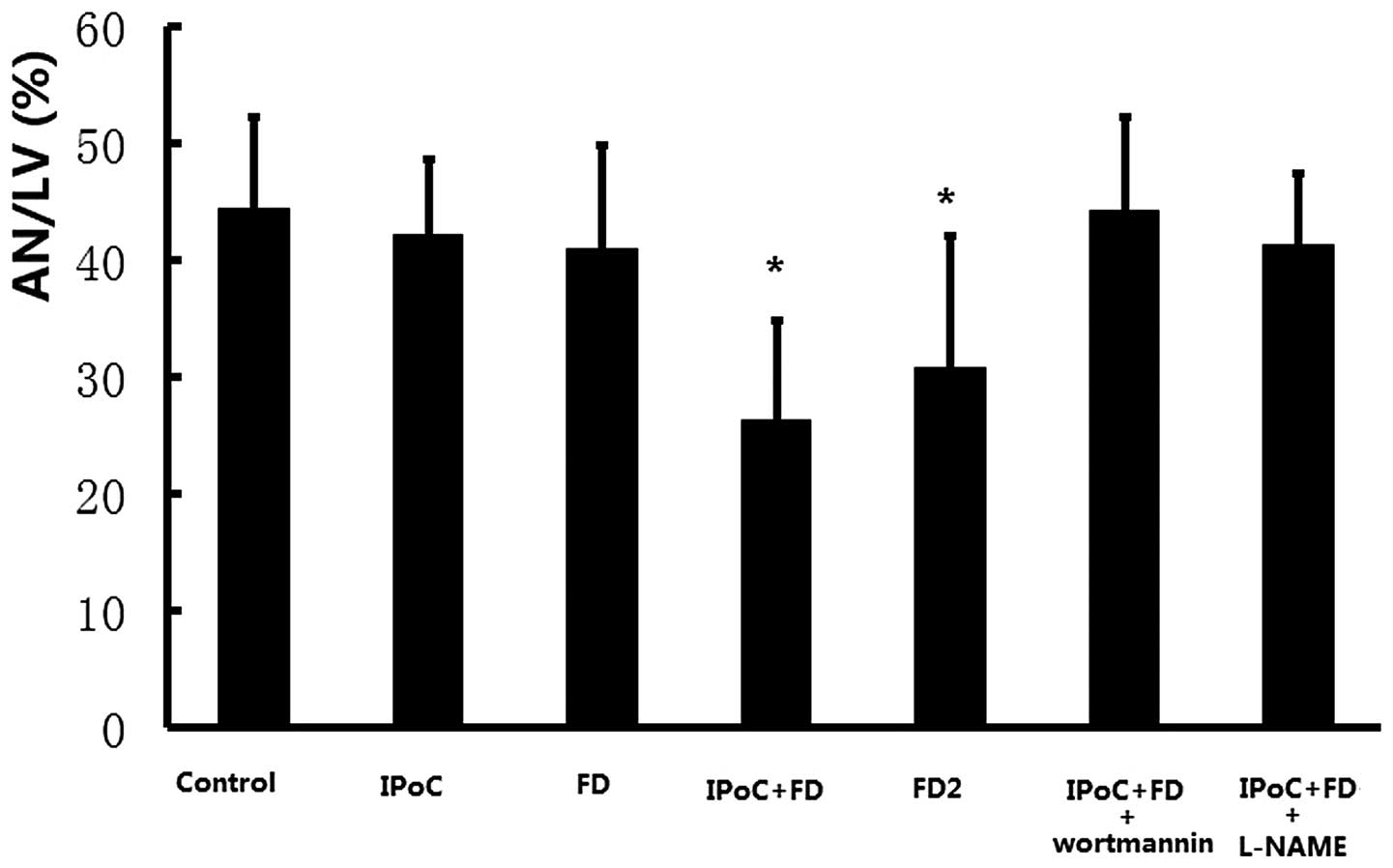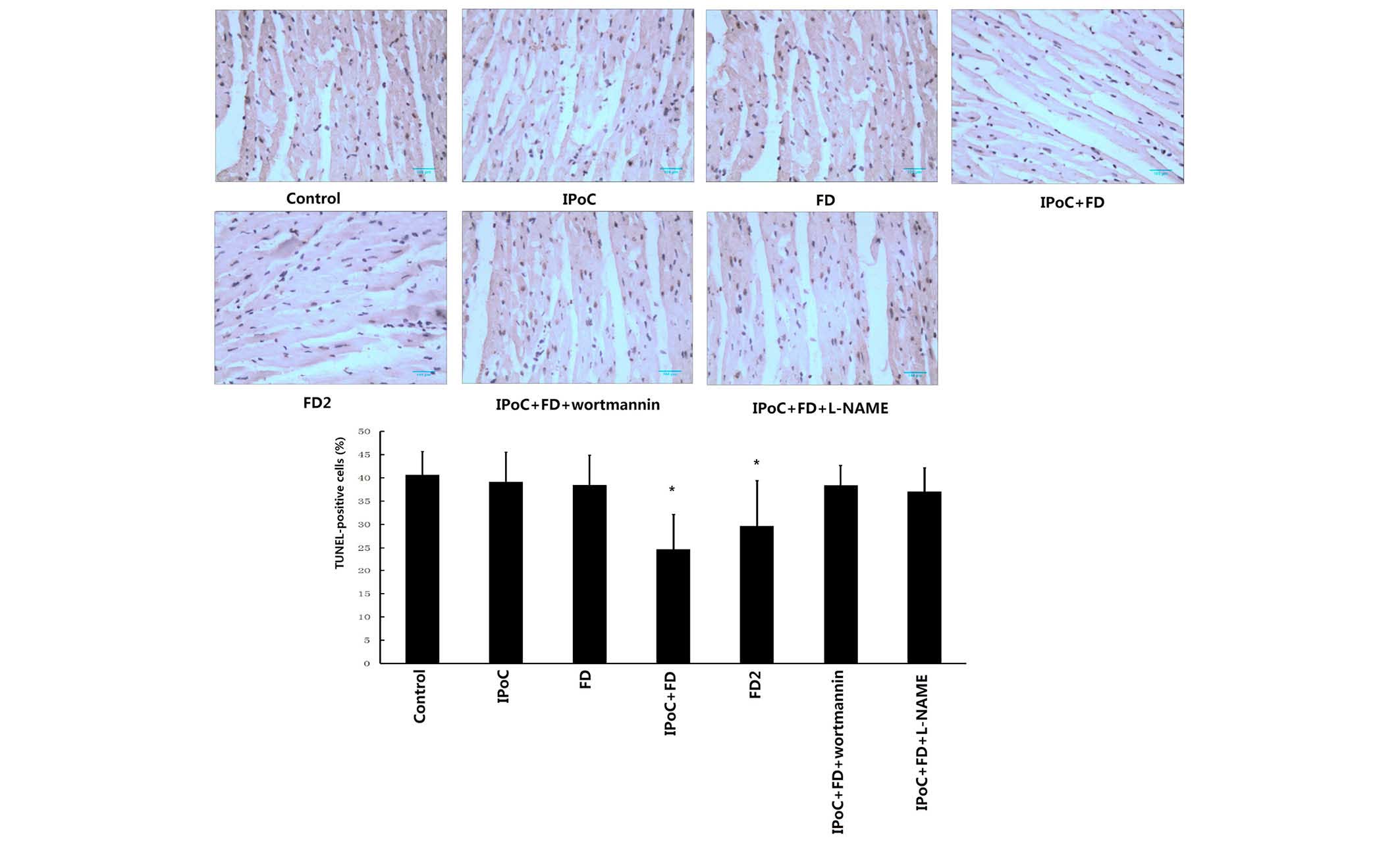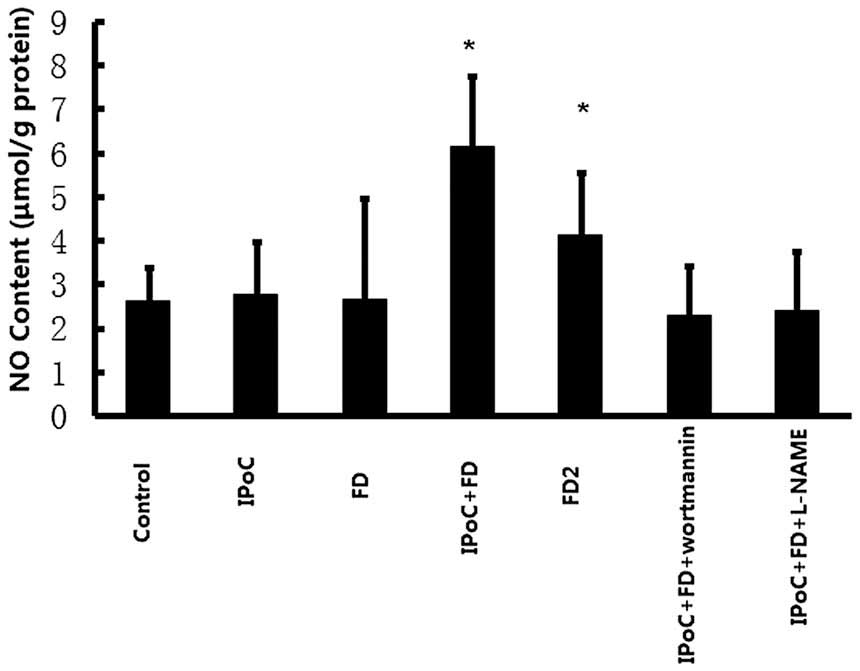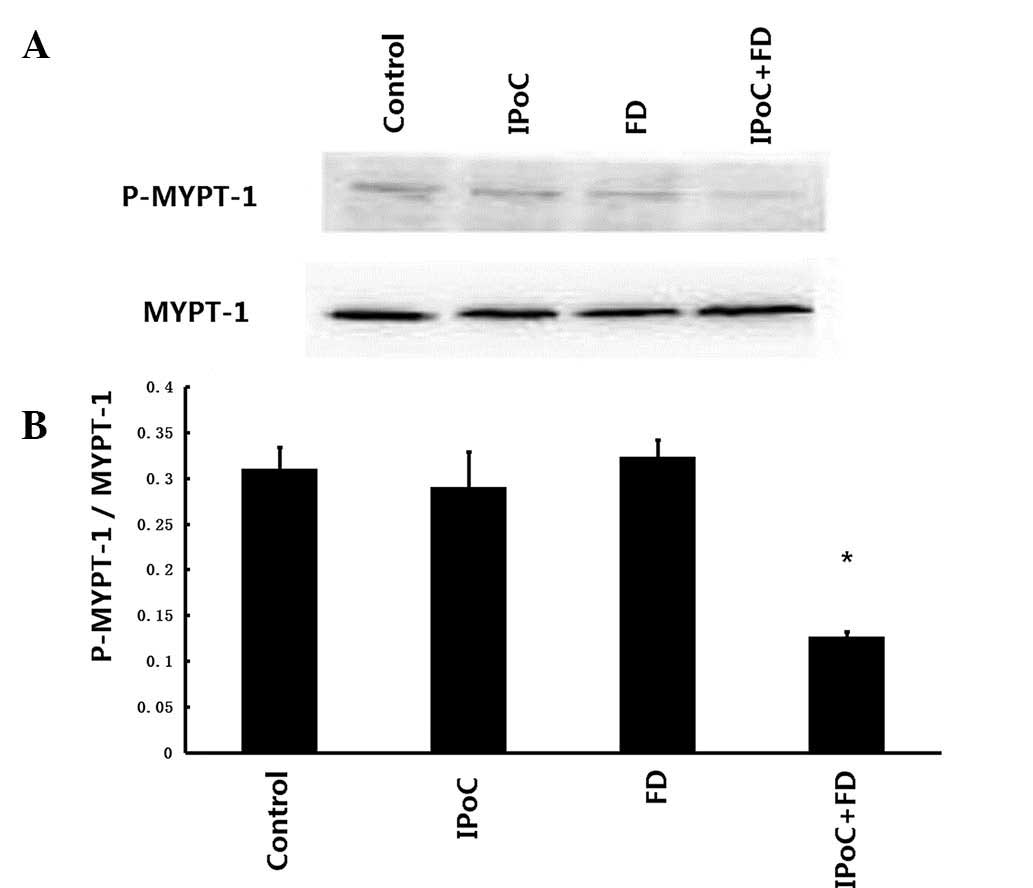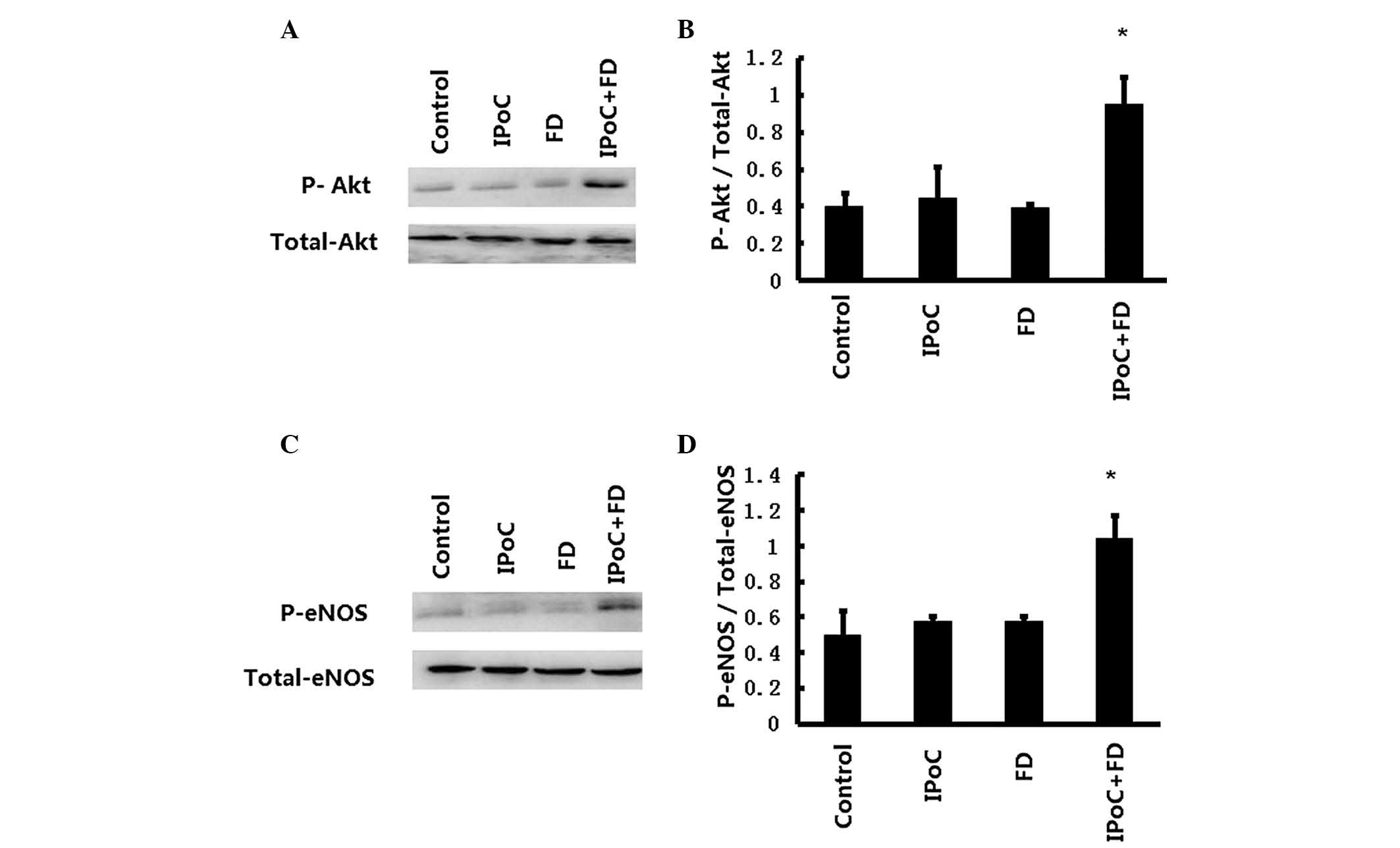|
1
|
Zhao ZQ, Corvera JS, Halkos ME, et al:
Inhibition of myocardial injury by ischemic postconditioning during
reperfusion: comparison with ischemic preconditioning. Am J Physiol
Heart Circ Physiol. 285:H579–H588. 2003.PubMed/NCBI
|
|
2
|
Schwartz LM and Lagranha CJ: Ischemic
postconditioning during reperfusion activates Akt and ERK without
protecting against lethal myocardial ischemia-reperfusion injury in
pigs. Am J Physiol Heart Circ Physiol. 290:H1011–H1018. 2006.
View Article : Google Scholar
|
|
3
|
Gross GJ, Gauthier KM, Moore J, et al:
Evidence for role of epoxyeicosatrienoic acids in mediating
ischemic preconditioning and postconditioning in dog. Am J Physiol
Heart Circ Physiol. 297:H47–H52. 2009. View Article : Google Scholar : PubMed/NCBI
|
|
4
|
Staat P, Rioufol G, Piot C, et al:
Postconditioning the human heart. Circulation. 112:2143–2148. 2005.
View Article : Google Scholar : PubMed/NCBI
|
|
5
|
Iliodromitis EK, Zoga A, Vrettou A, et al:
The effectiveness of postconditioning and preconditioning on
infarct size in hypercholesterolemic and normal anesthetized
rabbits. Atherosclerosis. 188:356–362. 2006. View Article : Google Scholar : PubMed/NCBI
|
|
6
|
Zhao JL, Yang YJ, You SJ, Cui CJ and Gao
RL: Different effects of postconditioning on myocardial no-reflow
in the normal and hypercholesterolemic mini-swines. Microvasc Res.
73:137–142. 2007. View Article : Google Scholar : PubMed/NCBI
|
|
7
|
Kupai K, Csonka C, Fekete V, et al:
Cholesterol diet-induced hyperlipidemia impairs the
cardioprotective effect of postconditioning: role of peroxynitrite.
Am J Physiol Heart Circ Physiol. 297:H1729–H1735. 2009. View Article : Google Scholar : PubMed/NCBI
|
|
8
|
Lauzier B, Delemasure S, Pesant M, et al:
A cholesterol-rich diet improves resistance to ischemic insult in
mouse hearts but suppresses the beneficial effect of
post-conditioning. J Heart Lung Transplant. 28:821–826. 2009.
View Article : Google Scholar
|
|
9
|
Andreadou I, Farmakis D, Prokovas E, et
al: Short-term statin administration in hypercholesterolaemic
rabbits resistant to postconditioning: effects on infarct size,
endothelial nitric oxide synthase, and nitro-oxidative stress.
Cardiovasc Res. 94:501–509. 2012. View Article : Google Scholar
|
|
10
|
Zhang FJ, Ma LL, Wang WN, et al:
Hypercholesterolemia abrogates sevoflurane-induced delayed
preconditioning against myocardial infarct in rats by alteration of
nitric oxide synthase signaling. Shock. 37:485–491. 2012.
View Article : Google Scholar
|
|
11
|
Ma LL, Zhang FJ, Qian LB, et al:
Hypercholesterolemia blocked sevoflurane-induced cardioprotection
against ischemia-reperfusion injury by alteration of the
MG53/RISK/GSK3β signaling. Int J Cardiol. 168:3671–3678.
2013.PubMed/NCBI
|
|
12
|
Fukumoto Y, Mohri M, Inokuchi K, et al:
Anti-ischemic effects of fasudil, a specific Rho-kinase inhibitor,
in patients with stable effort angina. J Cardiovasc Pharmacol.
49:117–121. 2007. View Article : Google Scholar : PubMed/NCBI
|
|
13
|
Wu DJ, Xu JZ, Wu YJ, et al: Effects of
fasudil on early atherosclerotic plaque formation and established
lesion progression in apolipoprotein E-knockout mice.
Atherosclerosis. 207:68–73. 2009. View Article : Google Scholar : PubMed/NCBI
|
|
14
|
Ho TJ, Huang CC, Huang CY and Lin WT:
Fasudil, a Rho-kinase inhibitor, protects against excessive
endurance exercise training-induced cardiac hypertrophy, apoptosis
and fibrosis in rats. Eur J Appl Physiol. 112:2943–2955. 2012.
View Article : Google Scholar
|
|
15
|
Wang N, Guan P, Zhang JP, et al: Fasudil
hydrochloride hydrate, a Rho-kinase inhibitor, suppresses
isoproterenol-induced heart failure in rats via JNK and ERK1/2
pathways. J Cell Biochem. 112:1920–1929. 2011. View Article : Google Scholar : PubMed/NCBI
|
|
16
|
Wolfrum S, Dendorfer A, Rikitake Y, et al:
Inhibition of Rho-kinase leads to rapid activation of
phosphatidylinositol 3-kinase/protein kinase Akt and cardiovascular
protection. Arterioscler Thromb Vasc Biol. 24:1842–1847. 2004.
View Article : Google Scholar : PubMed/NCBI
|
|
17
|
Li Y, Zhu W, Tao J, et al: Fasudil
protects the heart against ischemia-reperfusion injury by
attenuating endoplasmic reticulum stress and modulating SERCA
activity: the differential role for PI3K/Akt and JAK2/STAT3
signaling pathways. PLoS One. 7:e481152012. View Article : Google Scholar
|
|
18
|
Jiang ZH, Zhang TT and Zhang JF:
Protective effects of fasudil hydrochloride post-conditioning on
acute myocardial ischemia/reperfusion injury in rats. Cardiol J.
20:197–202. 2013. View Article : Google Scholar : PubMed/NCBI
|
|
19
|
Zhao H, Wang Y, Wu Y, et al:
Hyperlipidemia does not prevent the cardioprotection by
postconditioning against myocardial ischemia/reperfusion injury and
the involvement of hypoxia inducible factor-1alpha upregulation.
Acta Biochim Biophys Sin (Shanghai). 41:745–753. 2009. View Article : Google Scholar
|
|
20
|
Lv Y, Ren Y, Sun L, Wang S, Wei M and Jia
D: Protective effect of Na(+)/Ca(2+) exchange
blocker KB-R7943 on myocardial ischemia-reperfusion injury in
hypercholesterolemic rats. Cell Biochem Biophys. 66:357–363.
2013.
|
|
21
|
Byrne CJ, McCafferty K, Kieswich J, et al:
Ischemic conditioning protects the uremic heart in a rodent model
of myocardial infarction. Circulation. 125:1256–1265. 2012.
View Article : Google Scholar
|
|
22
|
Ferdinandy P, Schulz R and Baxter GF:
Interaction of cardiovascular risk factors with myocardial
ischemia/reperfusion injury, preconditioning, and postconditioning.
Pharmacol Rev. 59:418–458. 2007. View Article : Google Scholar : PubMed/NCBI
|
|
23
|
Donato M, D’Annunzio V, Berg G, et al:
Ischemic postconditioning reduces infarct size by activation of A1
receptors and KATP channels in both normal and hypercholesterolemic
rabbits. J Cardiovasc Pharmacol. 49:287–292. 2007. View Article : Google Scholar : PubMed/NCBI
|
|
24
|
Iliodromitis EK, Andreadou I, Prokovas E,
et al: Simvastatin in contrast to postconditioning reduces infarct
size in hyperlipidemic rabbits: possible role of
oxidative/nitrosative stress attenuation. Basic Res Cardiol.
105:193–203. 2010. View Article : Google Scholar
|
|
25
|
Noma K, Oyama N and Liao JK: Physiological
role of ROCKs in the cardiovascular system. Am J Physiol Cell
Physiol. 290:C661–C668. 2006. View Article : Google Scholar : PubMed/NCBI
|
|
26
|
Hamid SA, Bower HS and Baxter GF: Rho
kinase activation plays a major role as a mediator of irreversible
injury in reperfused myocardium. Am J Physiol Heart Circ Physiol.
292:H2598–H2606. 2007. View Article : Google Scholar : PubMed/NCBI
|
|
27
|
Jugdutt BI: Nitric oxide and
cardioprotection during ischemia-reperfusion. Heart Fail Rev.
7:391–405. 2002. View Article : Google Scholar : PubMed/NCBI
|
|
28
|
Suematsu Y, Ohtsuka T, Hirata Y, et al:
L-Arginine given after ischaemic preconditioning can enhance
cardioprotection in isolated rat hearts. Eur J Cardiothorac Surg.
19:873–879. 2001. View Article : Google Scholar
|
|
29
|
Izhar U, Schwalb H, Borman JB and Merin G:
Cardioprotective effect of L-arginine in myocardial ischemia and
reperfusion in an isolated working rat heart model. J Cardiovasc
Surg (Torino). 39:321–329. 1998.PubMed/NCBI
|
|
30
|
Dimmeler S, Fleming I, Fisslthaler B, et
al: Activation of nitric oxide synthase in endothelial cells by
Akt-dependent phosphorylation. Nature. 399:601–605. 1999.
View Article : Google Scholar : PubMed/NCBI
|
|
31
|
Dauber IM, Lesnefsky EJ, VanBenthuysen RM,
Weil JV and Horwitz ID: Reactive oxygen metabolite scanvengers
decrease functional coronary microvascular injury due to ischemia
reperfusion. Am J Physiol. 260:H42–H49. 1991.
|
|
32
|
Wilson SH, Simari RD, Best PJ, et al:
Simvastatin preserves coronary endothelial function in
hypercholesterolemia in the absence of lipid lowering. Arterioscler
Thromb Vasc Biol. 21:122–128. 2001. View Article : Google Scholar : PubMed/NCBI
|
|
33
|
Freixa X, Bellera N, Ortiz-Pérez JT, et
al: Ischaemic postconditioning revisited: lack of effects on
infarct size following primary percutaneous coronary intervention.
Eur Heart J. 33:103–112. 2012. View Article : Google Scholar
|
|
34
|
Tarantini G, Favaretto E, Marra MP, et al:
Postconditioning during coronary angioplasty in acute myocardial
infarction: the POST-AMI trial. Int J Cardiol. 162:33–38. 2012.
View Article : Google Scholar : PubMed/NCBI
|















